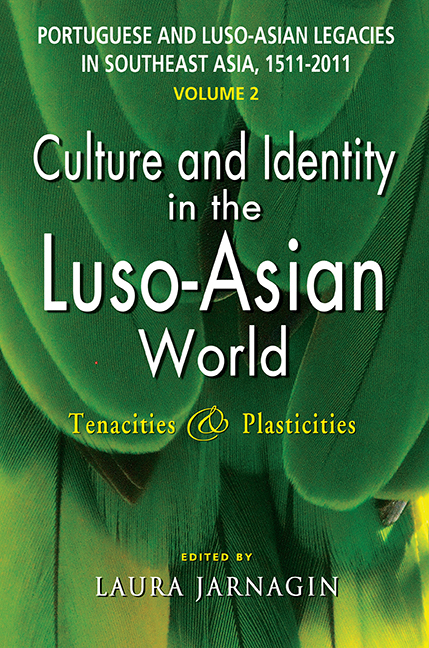 Portuguese and Luso-Asian Legacies in Southeast Asia, 1511-2011, vol. 2
Portuguese and Luso-Asian Legacies in Southeast Asia, 1511-2011, vol. 2 Book contents
- Frontmatter
- Contents
- List of Figures and Tables
- Preface
- List of Contributors
- Glossary
- Introduction: The Qualitative Properties of Cultures and Identities
- Part One Crafting Identity in the Luso-Asian World
- Part Two Cultural Components: Language, Architecture and Music
- Part Three Adversity and Accommodation
- 10 Portugal and China: An Anatomy of Harmonious Coexistence (Sixteenth and Seventeenth Centuries)
- 11 “Aocheng” or “Cidade do Nome de Deus”: The Nomenclature of Portuguese and Castilian Buildings of Old Macao from the “Reversed Gaze” of the Chinese
- 12 Enemies, Friends, and Relations: Portuguese Eurasians during Malacca's Dutch Era and Beyond
- Appendix: Maps
- Bibliography
- Index
- Titles in the Nalanda-Sriwijaya Studies Centre Series
10 - Portugal and China: An Anatomy of Harmonious Coexistence (Sixteenth and Seventeenth Centuries)
from Part Three - Adversity and Accommodation
Published online by Cambridge University Press: 21 October 2015
- Frontmatter
- Contents
- List of Figures and Tables
- Preface
- List of Contributors
- Glossary
- Introduction: The Qualitative Properties of Cultures and Identities
- Part One Crafting Identity in the Luso-Asian World
- Part Two Cultural Components: Language, Architecture and Music
- Part Three Adversity and Accommodation
- 10 Portugal and China: An Anatomy of Harmonious Coexistence (Sixteenth and Seventeenth Centuries)
- 11 “Aocheng” or “Cidade do Nome de Deus”: The Nomenclature of Portuguese and Castilian Buildings of Old Macao from the “Reversed Gaze” of the Chinese
- 12 Enemies, Friends, and Relations: Portuguese Eurasians during Malacca's Dutch Era and Beyond
- Appendix: Maps
- Bibliography
- Index
- Titles in the Nalanda-Sriwijaya Studies Centre Series
Summary
The history of Sino-Portuguese encounters — their initial years in particular — has often been told. Cultural dimensions of the exchanges between the two parties also have been studied repeatedly. While there is no need to reiterate those investigations, we obviously cannot proceed without taking into account some of the known details and therefore we will start out by giving a chronologically arranged synoptic introduction. Not that the events “in themselves” are essentially of interest to us here, but rather the structural principles underlying these contacts; in other words, the conditions which were to shape certain modes of interaction over a long period of time. We must take into account the fact that these principles evidently have been subject to change, that they were not always consistent, and that some of the images that the scholarship has maintained to this day would indeed have to be redrawn. There is a central element in particular which is pertinent to this: speaking of “China” as an entirely self-contained entity in its own right — in terms of economy and culture — seems only partly correct for the sixteenth and seventeenth centuries. A more useful assumption would be to consider that the Portuguese were in fact facing a number of various local Chinese groups and regions. And something similar applies to the Portuguese side of the matter: the Portuguese-speaking population living in permanent residency in Macao did indeed act and think in quite different ways from those recently arrived from Europe or India. One might almost speak of different identities, though I would not want to go so far as that.
CHRONOLOGY
Let us begin then with a briefly summarized chronology of important events. The first Sino-Portuguese encounters on record took place in Malacca. Several Chinese groups seem to have welcomed the Portuguese conquest of the locale (in 1511) — its part in international trade at the time has been vastly overstated — and henceforth worked together with the Portuguese.
- Type
- Chapter
- Information
- Portuguese and Luso-Asian Legacies in Southeast Asia, 1511-2011, vol. 2Culture and Identity in the Luso-Asian World: Tenacities & Plasticities, pp. 225 - 242Publisher: ISEAS–Yusof Ishak InstitutePrint publication year: 2012


